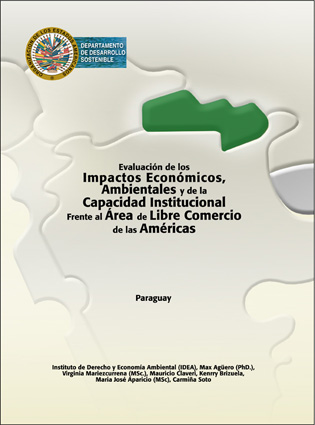Environmental Law, Policy and Governance Program
Past Projects
Resources
Environmental Assessments and Capacity Building for Trade Liberalization in the Americas: MERCOSUR
Argentina

The assessment for Argentina was conducted
with Fundación Ambiente y Recursos Naturales and it aimed to study the possible
economic effects of the proposed Free Trade Area of the Americas (FTAA). This
assessment looks at some of the key environmental issues in relevant
sectors such as the meat industry, oil and its derivatives, sugar processing,
soy production, iron and steel making, and non-metallic mining the mentioned
sectors. It also highlights the need for an in-depth life cycle analysis, in
particular for the soy sector, given the high demand, increased activities, and
the nature of the social and environmental effects of its production. One of the
main findings of this assessments is that there exists a the need for a formal communication mechanism
between policy makers in different sectors, leading towards the inclusion of
sustainability in trade and public policy discussions. Download complete
publication.![]()
Brazil

In Brazil, the assessment focused on the
industrial sector and indicated that the main environmental concerns associated with the
implementation of the FTAA could include water contamination and decreased
air quality due to outdoor air pollution. However, the assessment highlights
that those industries that could affect air quality in Brazil use
environmentally friendly technologies in order to meet the sustainability and
market access requirements of the export markets. Additionally, this assessment
examined the Brazilian legal-institutional frameworks and the internalization of
environmental cost by industry, showing that theses costs do not affect
competitiveness. Finally, this assessment includes some recommendations for
regulating various entities in terms of promoting the efficiency and competitiveness of the
Brazilian industrial sector. Download complete publication.![]()
- Summary table
with economic, social, environmental and legal/institutional
impacts of trade liberalization for key sector in Brazil.

Paraguay

The assessment in Paraguay was conducted with the
Paraguayan
Institute for Environmental Law and Economics, and the sectors analyzed were soy and cotton, paying particular attention to soy. The economic impacts of the rapid increase in
soy production in the context of free trade were analyzed, as well as the
environmental and social effects including soy erosion and the loss of biodiviersity
and jobs due to the mechanical nature of soy production and the spread of previously eradicated
diseases. This assessment also includes key
policy recommendations for agricultural diversification and the integration of
sustainability into public policy and decision making. Download complete
publication.![]()
Uruguay
The outcomes of the assessment conducted with Ecos in Uruguay highlights that the meat and wool sectors could be presented with opportunities for growth under trade liberalization. Paper and rice demonstrated slightly negative economic impacts in the analysis. However, the environmental effects derived from changes in these sectors were not considerable due to preexisting regulations. However, the assessment indicates that in the forestry sector there could be serious environmental impacts from the cultivation of non native species and soil erosion. Another issue examined in the analysis was the increase in soy production in response to international demand. This has been causing the expansion of the agricultural frontier, thus placing additional pressure on soil due to the eradication of native forest for agricultural purposes. Coordination within MERCOSUR for sustainable development policies and a common agricultural policy are some of the recommendations included in this assessment.
- National Peer Review Workshop in Uruguay.
-
Summary table with economic, social, environmental and
legal/institutional impacts of trade liberalization for key
sector in MERCOSUR.



